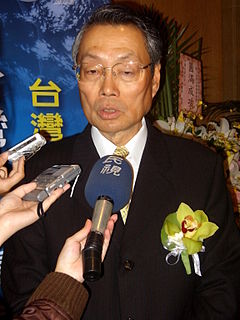A Quote by Stan Shih
Because I had visited Silicon Valley, I recognized the microprocessor was going to lead the second industrial revolution. We Chinese could not miss that opportunity again - we missed the first industrial revolution already. We put our effort into trying to bring this new technology from the United States to Taiwan. That was the begining of Acer.
Related Quotes
The history of lead is a history of neglect. It's a history of decisions on our part not to address the broad implications of what we did to ourselves during the industrial revolution and in the first part of the century when our cities expanded broadly, when we built our housing and we began to depend upon lead as a mainstay of our new industrial culture. We put this stuff in even though we knew it was dangerous, we knew it was going to hurt kids.
When the industrial revolution happened there was the Luddistic movement, and there was a fear that machinery would replace all the labor. Whenever we had a technological revolution we had this fear. So if you look backwards, these fears were not justified, and I think they were driven by our very human inability to visualize what new jobs will be created by this new technology.
China is a great manufacturing center, but it's actually mostly an assembly plant. So it assembles parts and components, high technology that comes from the surrounding industrial - more advanced industrial centers - Japan, Taiwan, South Korea, Singapore, the United States, Europe - and it basically assembles them.
I don't. We've had three technological revolutions that have changed the course of human history, all driven by physics. In the first, the industrial revolution, physicists developed Newtonian mechanics and thermodynamics, which gave us the steam engine and machine power. The second technological revolution was the electricity revolution. That gave us radio, television, and telecommunications. Then, physicists developed the laser and the transistor.
The most revolutionary aspect of technology is its mobility. Anybody can learn it. It jumps easily over barriers of race and language. ... The new technology of microchips and computer software is learned much faster than the old technology of coal and iron. It took three generations of misery for the older industrial countries to master the technology of coal and iron. The new industrial countries of East Asia, South Korea, and Singapore and Taiwan, mastered the new technology and made the jump from poverty to wealth in a single generation.
Biomimicry is innovation inspired by nature. In a society accustomed to dominating or 'improving' nature, this respectful imitation is a radically new approach, a revolution really. Unlike the Industrial Revolution, the Biomimicry Revolution introduces an era based not on what we can extract from nature, but on what we can learn from her.































